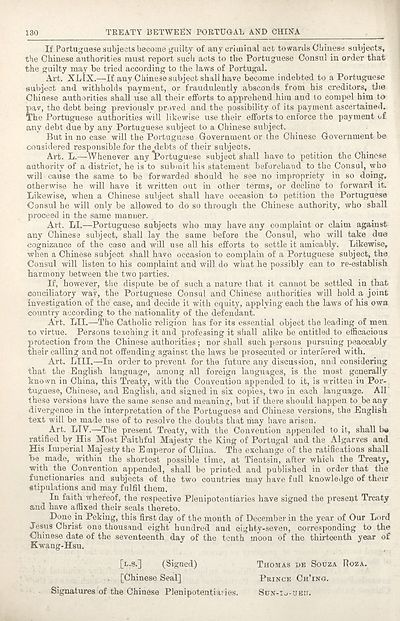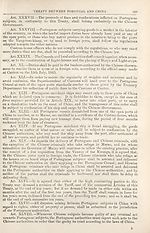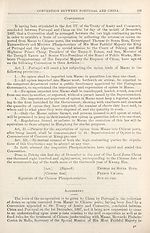1918
(198) Page 130
Download files
Complete book:
Individual page:
Thumbnail gallery: Grid view | List view

130
TREATY BETWEEN PORTUGAL AND CHINA
If Portuguese subjects become guilty of any criuiiual act towards Cbinese subjects,
the Chinese authorities must report such acts to the Portuguese Consul in order that
the guilty may be tried according to the laws of Portugal.
Art. XL1X.—If any Chinese subject shall have become indebted to a Portuguese
subject and withholds payment, or fraudulently absconds from his creditors, the
Chinese authorities shall use all their efforts to apprehend him and to compel him to
pav, the debt being previously proved and the possibility of its payment ascertained.
The Portuguese authorities will likewise use their efforts to enforce the payment of
any debt due by any Portuguese subject to a Chinese subject.
But in no case will the Portuguese Government or the Chinese Government be
considered responsible for the debts of their subjects.
Art. L.—Whenever any Portuguese subject shall have to petition the Chinese
authority of a district, he is to submit his statement beforehand to the Consul, who
will cause the same to be forwarded should he see no impropriety in so doing,
otherwise he will have it written out in other terms, or decline to forward it.
Likewise, when a Chinese subject shall have occasion to petition the Portuguese
Consul he will only be allowed to do so through the Chinese authority, who shall
proceed in the same manner.
Art. LI.—Portuguese subjects who may have any complaint or claim against
any Chinese subject, shall lay the same before the Consul, who will take due
cognizance of the case and will use all his efforts to settle it amicably. Likewise,
when a Chinese subject shall have occasion to complain of a Portuguese subject, the
Consul will listen to his complaint and will do what he possibly can to re-establish
harmony between the two parties.
If, however, the dispute be of such a nature that it cannot be settled in that
conciliatory way, the Portuguese Consul and Chinese authorities will hold a joint
investigation of the case, and decide it with equity, applying each the laws of his own
country according to the nationality of the defendant.
Art. LII.—The Catholic religion has for its essential object the leading of men
to virtue. Persons teaching it and professing it shall alike be entitled to efficacious
protection from the Chinese authorities ; nor shall such persons pursuing peaceably
their calling and not offending against the laws be prosecuted or interfered with.
Art. LIIL—In order to prevent for the future any discussion, and considering
that the English language, among all foreign languages, is the most generally
known in China, this Treaty, with the Convention appended to it, is written in Por¬
tuguese, Chinese, and English, and signed in six copies, two in each language. AH'
these versions have the same sense and meaning, but if there should happen to be any
divergence in the interpretation of the Portuguese and Chinese versions, the English
text will be made use of to resolve the doubts that may have arisen.
Art. LIV.—The present Treaty, with the Convention appended to it, shall ba
ratified by His Most Faithful Majesty the King of Portugal and the Algarves and
His Imperial Majesty the Emperor of China. The exchange of the ratifications shall
be made, within the shortest possible time, at Tientsin, after which the Treaty,
with the Convention appended, shall be printed and published in order that the
functionaries and subjects of the two countries may have full knowledge of their
stipulations and may fulfil them.
In faith whereof, the respective Plenipotentiaries have signed the present Treaty
and have affixed their seals thereto.
Done in Peking, this first day of the month of December in the year of Our Lord
Jesus Christ one thousand eight hundred and eighty-seven, corresponding to the
Chinese date of the seventeenth day of the tenth moon of the thirteenth year of
Kwang-Hsu.
Signatures of the Chinese Plenipotentiaries.
[l.s.] (Signed)
[Chinese Seal]
Thomas he Souza Roza.
Prince Ch’ing.
SuN-Io-UEtr.
TREATY BETWEEN PORTUGAL AND CHINA
If Portuguese subjects become guilty of any criuiiual act towards Cbinese subjects,
the Chinese authorities must report such acts to the Portuguese Consul in order that
the guilty may be tried according to the laws of Portugal.
Art. XL1X.—If any Chinese subject shall have become indebted to a Portuguese
subject and withholds payment, or fraudulently absconds from his creditors, the
Chinese authorities shall use all their efforts to apprehend him and to compel him to
pav, the debt being previously proved and the possibility of its payment ascertained.
The Portuguese authorities will likewise use their efforts to enforce the payment of
any debt due by any Portuguese subject to a Chinese subject.
But in no case will the Portuguese Government or the Chinese Government be
considered responsible for the debts of their subjects.
Art. L.—Whenever any Portuguese subject shall have to petition the Chinese
authority of a district, he is to submit his statement beforehand to the Consul, who
will cause the same to be forwarded should he see no impropriety in so doing,
otherwise he will have it written out in other terms, or decline to forward it.
Likewise, when a Chinese subject shall have occasion to petition the Portuguese
Consul he will only be allowed to do so through the Chinese authority, who shall
proceed in the same manner.
Art. LI.—Portuguese subjects who may have any complaint or claim against
any Chinese subject, shall lay the same before the Consul, who will take due
cognizance of the case and will use all his efforts to settle it amicably. Likewise,
when a Chinese subject shall have occasion to complain of a Portuguese subject, the
Consul will listen to his complaint and will do what he possibly can to re-establish
harmony between the two parties.
If, however, the dispute be of such a nature that it cannot be settled in that
conciliatory way, the Portuguese Consul and Chinese authorities will hold a joint
investigation of the case, and decide it with equity, applying each the laws of his own
country according to the nationality of the defendant.
Art. LII.—The Catholic religion has for its essential object the leading of men
to virtue. Persons teaching it and professing it shall alike be entitled to efficacious
protection from the Chinese authorities ; nor shall such persons pursuing peaceably
their calling and not offending against the laws be prosecuted or interfered with.
Art. LIIL—In order to prevent for the future any discussion, and considering
that the English language, among all foreign languages, is the most generally
known in China, this Treaty, with the Convention appended to it, is written in Por¬
tuguese, Chinese, and English, and signed in six copies, two in each language. AH'
these versions have the same sense and meaning, but if there should happen to be any
divergence in the interpretation of the Portuguese and Chinese versions, the English
text will be made use of to resolve the doubts that may have arisen.
Art. LIV.—The present Treaty, with the Convention appended to it, shall ba
ratified by His Most Faithful Majesty the King of Portugal and the Algarves and
His Imperial Majesty the Emperor of China. The exchange of the ratifications shall
be made, within the shortest possible time, at Tientsin, after which the Treaty,
with the Convention appended, shall be printed and published in order that the
functionaries and subjects of the two countries may have full knowledge of their
stipulations and may fulfil them.
In faith whereof, the respective Plenipotentiaries have signed the present Treaty
and have affixed their seals thereto.
Done in Peking, this first day of the month of December in the year of Our Lord
Jesus Christ one thousand eight hundred and eighty-seven, corresponding to the
Chinese date of the seventeenth day of the tenth moon of the thirteenth year of
Kwang-Hsu.
Signatures of the Chinese Plenipotentiaries.
[l.s.] (Signed)
[Chinese Seal]
Thomas he Souza Roza.
Prince Ch’ing.
SuN-Io-UEtr.
Set display mode to:
![]() Universal Viewer |
Universal Viewer | ![]() Mirador |
Large image | Transcription
Mirador |
Large image | Transcription
Images and transcriptions on this page, including medium image downloads, may be used under the Creative Commons Attribution 4.0 International Licence unless otherwise stated. ![]()
| Asian directories and chronicles > 1918 > (198) Page 130 |
|---|
| Permanent URL | https://digital.nls.uk/194895904 |
|---|
| Attribution and copyright: |
|
|---|---|
| Description | Volumes from the Asian 'Directory and Chronicle' series covering 1917-1941, but missing 1919 and 1923. Compiled annually from a multiplicity of local sources and research. They provide listings of each country's active corporations, foreign residents and government agencies of all nationalities for that year, together with their addresses. Content includes: various treaties; coverage of conflicts; currencies and taxes; consular fees; weights and measures; public holidays; festivals and traditions. A source of information for both Western states and communities of foreigners living in Asia. Published by Hongkong Daily Press. |
|---|---|
| Shelfmark | H3.86.1303 |
| Additional NLS resources: |

